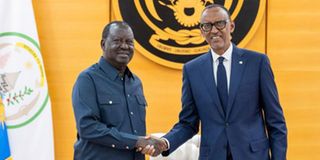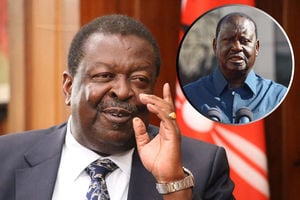
Rwandan President Paul Kagame (right) with Kenyan opposition leader Raila Odinga in Kigali on March 8, 2024.
The African Union Executive Council will tomorrow (Friday) hold a meeting in Addis Ababa, Ethiopia, that will make or break Raila Odinga’s candidacy for chairperson of the African Union Commission (AUC).
The Executive Council, composed of foreign affairs ministers of member states, is expected to review a set of proposals advanced by the AU’s legal counsel and deliberate on preparations for the election of senior leadership of the AUC expected to take place in February next year.
Prime Cabinet Secretary Musalia Mudavadi, who also doubles up as the CS for Foreign and Diaspora Affairs, told the Nation on Wednesday that he was set to attend tomorrow’s meeting in Ethiopia.
According to multiple interviews conducted by the Nation on Wednesday, Mr Odinga is poised to profit from a general disagreement over a draft rule change that had threatened to lock him out Mr Odinga of the running for the AUC post.
The AU’s Permanent Representatives Committee (PRC) has agreed on certain recommendations that will be incorporated in the draft decision to be presented to the Executive Council tomorrow.
Some member states opposed the proposed stiff set of rules meant to tie rotational positions to gender parity.
One proposal had sought to have regional and intraregional rotation such that countries that had previously held the chairperson or deputy chairperson role excluded from the race.
Another proposal suggested that male chairpersons are alternated with female ones, which would have meant that the February election is restricted to female candidates.
But ahead of the Executive Council session, diplomatic sources indicated that divisions, which are advantageous to Kenya’s candidacy, have arisen mainly because the draft rules also deny incumbents eligible to run for a second term a chance.
Members also refused the gender alternation within eligible regions, asking instead to grant autonomy to those regions to decide their best talents.
Both proposals could have hurt Mr Odinga because he is male, and Kenya has had an AUC deputy chairperson before in Dr Erastus Mwencha (2008 to 2016).
By last evening, AU members had largely agreed on rotation between regions but without the compulsory demand to alternate genders.
A source indicated that this means Eastern Africa will still be eligible to front a candidate for chairperson while Northern Africa will contest for deputy, if the council agrees and the AU Assembly endorses the proposal.
A retired diplomat associated with the lobbying said tomorrow’s meeting will be crucial because divisions without consensus may mean a relapse to status quo where regional rotation hasn’t been practiced as a rule.
The rotation is supposed to follow regions in English alphabetical order: Central, Eastern, Northern, Southern and Western.
They also agreed that gender parity and intra-regional rotation need not isolate any members from the eligible regions. This allows both male and female candidates from all countries in the eligible geographical regions to contest.
“They want regions to determine their own candidates, not for AU to impose on them gender. Rotation to remain, however,” a source told the Nation in confidence.
The Executive Council currently excludes all countries that have violated the AU policy on unconstitutional changes in government.
They include Sudan, Gabon, Niger, Mali, Burkina Faso and Guinea. Once it adopts the proposed changes, the Assembly will need to approve them for them to become official policy.
“The stars are aligned in our favour. Under AU election rules, Kenya and the other AU member states in the Eastern Africa region are well positioned to produce the next AUC chair next year,” Mr Mudavadi told the Nation in an interview.
“Going by rotation, Eastern ranks ahead of Northern Africa, so we have the best opportunity to front our candidate,” Mr Mudavadi said.
“The rules, which are part of wide-ranging AU reforms that began in 2016, recognise the need for a more equitable and inclusive AU leadership, including the chair, deputy chair and commissioners,” he said.
The Southern, Central and Western regions, he noted, have dominated the chairperson position since 2002.
Now, if rotation is followed, the Eastern region will produce the next chairperson while the North will produce the next deputy.
The current chairperson, Moussa Faki Mahamat is from Chad, which is in Central Africa. He is deputised by Dr Monique Nsanzabaganwa of Rwanda.
But there is still dissatisfaction among some member states that some of the incumbents, eligible to run for a second term, will be ineligible if rotation is allowed.
However, consensus has built around the fact that those eligible to contest can do so, as long as their eligible regions endorse their candidature, introducing a new type of lobbying for nearly all positions in the AUC.
Another diplomat said: “So, rotation is to happen, but each of the sub regions entitled to contest retains the right to choose a method. This effectively also solves the other controversial proposal, one which had sought to bar Odinga because Kenya had held the DCP position before in Erastus Mwencha.”
“But the new changes have to be approved on Friday (tomorrow) or else status quo operates. Status quo means no rotation between regions,” the top diplomat explained.
Mr Mudavadi said that the Kenyan government is determined to ensure the country secures the AUC post through Mr Odinga. He noted that the campaigns for Mr Odinga are a national effort and are not only being pushed by the government.
“Hon Odinga’s candidacy represents Kenya’s aspiration to lead the AU, and we are witnessing a strong show of support from across the political spectrum and various sectors of Kenyan society,” said Mr Mudavadi.
“The entire government apparatus, under the leadership of His Excellency the President and with a team from the Office of the Prime Cabinet Secretary and Ministry of Foreign and Diaspora Affairs, is actively working to ensure success,” he added.
But Mr Mudavadi would not discuss the issue of other member states in the region backing Mr Odinga’s rivals, saying that he cannot speculate and that Kenya’s neighbours have generally pledged to support Mr Odinga’s bid.
“Our campaign is progressing well. We are actively engaged in reaching out to other member states. This process is still at a relatively early stage. We anticipate a period of active campaigning as we get closer to the elections early next year. We will share more details as the process evolves to keep Kenyans informed and engaged,” he said.
Mr Mudavadi disclosed that the campaign team includes “our diplomatic missions across Africa, which are playing a key role in engaging with other member states and building support”.
“Beyond the government, we are seeing prominent Kenyans from different backgrounds—business leaders, civil society representatives, and cultural figures—lending their voices to this campaign. Our resolve is to unite all Kenyans in supporting Hon. Odinga, who has demonstrated his vision for a more united, prosperous, and peaceful Africa,” the PCS said.
Former Kenya ambassador to the United States of America Elkanah Odembo stated that “Mr Odinga’s knowledge of Africa, his passion for, and belief in the continent, will be on display in the next few weeks as he shares his vision and mission for Africa”.
“Africa will soon see and appreciate, that this is a man who not only shares the dream of our Pan-Africanist founding fathers, but is also completely in step with the AUs Agenda 2063 of a prosperous, strong, united and influential global player and partner,” Mr Odembo said.
Mr Odinga told the Nation in Wajir last week that he was determined to reach out to various heads of state to get their support.
“I have talked to several heads of state, including Uganda’s Yoweri Museveni, who has agreed to propose my name for the position,” Mr Odinga said.
The former Prime Minister also held talks with Rwanda President Paul Kagame last week.
On reports that former Tanzania President Jakaya Kikwete was also interested in the seat, Mr Mudavadi said “We cannot speculate on their plans, but we remain confident in Hon. Odinga’s qualifications and our diplomatic efforts to secure support for his candidacy”.
“Our focus is on highlighting Hon. Odinga’s strengths and building a strong campaign that demonstrates his commitment to a more prosperous and united Africa,” said Mr Mudavadi.
“Kenya’s strength lies in its unity. We encourage constructive dialogue and open debate, embracing all voices in building a brighter future for our nation,” he said, adding that there should be no room for “frivolous talk”.









